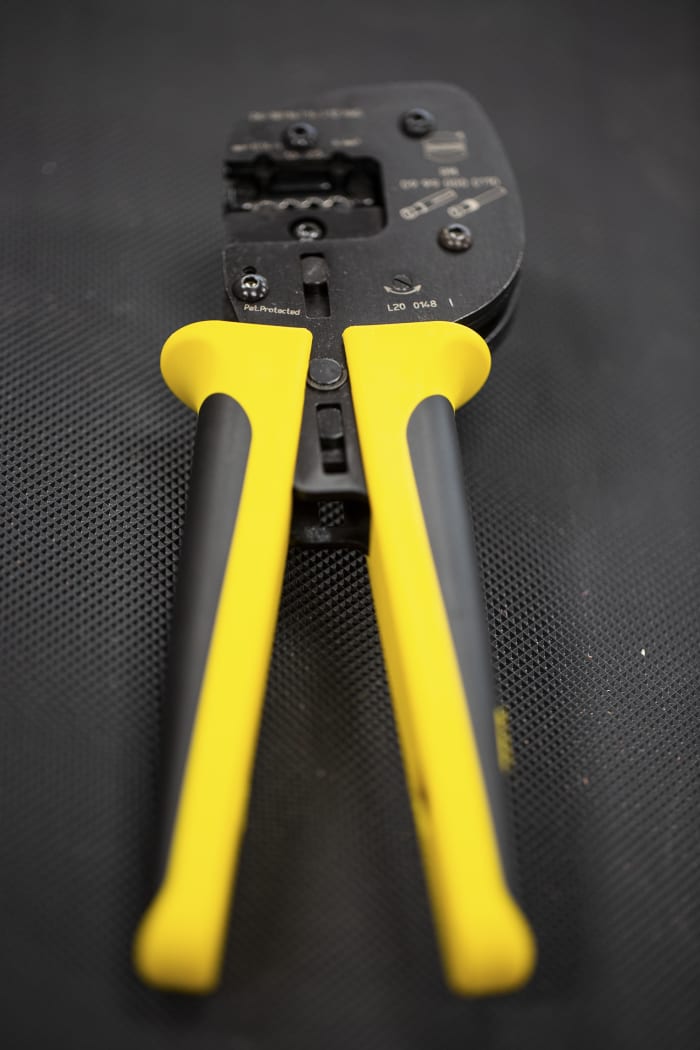HARTING Hand Ratcheting Crimp Tool for Han D Connector Contacts, Han E Connector Contacts, Han-Yellock Connector

Technical Document
Specifications
Brand
HartingProduct Type
Crimp Tool
Operation
Hand
For Use With
Han D Connector Contacts, Han E Connector Contacts, Han-Yellock Connector Contacts
Ratcheting
Yes
Overall Length
255 mm
Country of Origin
Germany
Product details
Harting Service Crimp Tool
A service crimp tool from Harting for use with solid turned Han D, Han E, and Han-Yellock Series crimp contacts. This crimp tool offers interchangeable locators designed for this range of crimp contacts and is capable of crimping male and female contacts from 0.14 mm to 2.5 mm. A ratchet mechanism has been incorporated into the device that prevents premature opening before the completion of a crimp, ensuring consistent crimping quality.
Features and Benefits
• Designed to operate on Harting Han D, Han E and Han-Yellock series crimp contacts
• Interchangeable locator
• Ratchet Action
• Early Release Action
• Reduced hand strain
What do you get?
• Service crimp tool
• Locator Han D (supplied loose)
• Locator Han E (mounted)
• Instructions
Typical Applications:
• Maintenance & repair
• Electrical Installations
• Cable assemblies
FAQ:
What are the benefits of a locator?
The locator guarantees that the crimp contact is terminated in the proper position. They can be removed by unscrewing the fixing screw on the fixed jaw.
What is the difference between un-insulated and insulated crimp tools?
Un-insulated crimp tools are typically used for general applications, where-as the insulated crimp tools have been VDE tested up to 1000 V, designed for use where electrical current is present.
How do you maintain the product?
• Axles and other movable parts should be regularly lubricated.
• Lubrication* is recommended at least every 10,000 cycles whenever the tool is exposed to contaminants.
• Adjustment of the crimping die nests should also be checked. Readjustment of the pressure adjustment axle is necessary when the pre-load of the tool decreases significantly.
The Importance of a High-Quality Crimp
When a crimping tool is used on a terminal, two crimps take place at the same time. One is the electrical connection between the conductor and terminal. The other is the insulation crimp which provides strain relief against vibration and tension. It is important that the electrical connection is gas-tight without any voids between the wire strands and the terminal. If there any voids present, then corrosion can occur causing resistance and excessive heat which damages the electrical connection. Using a good quality crimping tool will ensure that a full, gas-tight crimp is produced preventing future deterioration of the electrical connection and insulation breakage.
Stock information temporarily unavailable.
Please check again later.
€ 249.44
Each (Exc. VAT)
1
€ 249.44
Each (Exc. VAT)
1
Buy in bulk
| Quantity | Unit price |
|---|---|
| 1 - 4 | € 249.44 |
| 5+ | € 242.21 |
Technical Document
Specifications
Brand
HartingProduct Type
Crimp Tool
Operation
Hand
For Use With
Han D Connector Contacts, Han E Connector Contacts, Han-Yellock Connector Contacts
Ratcheting
Yes
Overall Length
255 mm
Country of Origin
Germany
Product details
Harting Service Crimp Tool
A service crimp tool from Harting for use with solid turned Han D, Han E, and Han-Yellock Series crimp contacts. This crimp tool offers interchangeable locators designed for this range of crimp contacts and is capable of crimping male and female contacts from 0.14 mm to 2.5 mm. A ratchet mechanism has been incorporated into the device that prevents premature opening before the completion of a crimp, ensuring consistent crimping quality.
Features and Benefits
• Designed to operate on Harting Han D, Han E and Han-Yellock series crimp contacts
• Interchangeable locator
• Ratchet Action
• Early Release Action
• Reduced hand strain
What do you get?
• Service crimp tool
• Locator Han D (supplied loose)
• Locator Han E (mounted)
• Instructions
Typical Applications:
• Maintenance & repair
• Electrical Installations
• Cable assemblies
FAQ:
What are the benefits of a locator?
The locator guarantees that the crimp contact is terminated in the proper position. They can be removed by unscrewing the fixing screw on the fixed jaw.
What is the difference between un-insulated and insulated crimp tools?
Un-insulated crimp tools are typically used for general applications, where-as the insulated crimp tools have been VDE tested up to 1000 V, designed for use where electrical current is present.
How do you maintain the product?
• Axles and other movable parts should be regularly lubricated.
• Lubrication* is recommended at least every 10,000 cycles whenever the tool is exposed to contaminants.
• Adjustment of the crimping die nests should also be checked. Readjustment of the pressure adjustment axle is necessary when the pre-load of the tool decreases significantly.
The Importance of a High-Quality Crimp
When a crimping tool is used on a terminal, two crimps take place at the same time. One is the electrical connection between the conductor and terminal. The other is the insulation crimp which provides strain relief against vibration and tension. It is important that the electrical connection is gas-tight without any voids between the wire strands and the terminal. If there any voids present, then corrosion can occur causing resistance and excessive heat which damages the electrical connection. Using a good quality crimping tool will ensure that a full, gas-tight crimp is produced preventing future deterioration of the electrical connection and insulation breakage.
